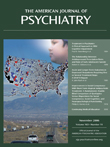Validation of Remission Criteria for Schizophrenia
Abstract
Objective: Remission criteria for schizophrenia have been proposed, consisting of a time criterion and a symptomatic remission criterion. With longitudinal data of a representative patient group (N=317; median follow-up: 1,132 days), validity of the symptomatic remission criterion was investigated. Method: In a group of 145 patients meeting the symptomatic remission criterion at baseline and a group of 172 patients not meeting it at baseline, change over time in remission status was examined in relation to change in various functional outcomes. Results: In both groups, change over time with the symptomatic remission criterion was associated with substantial changes in unmet needs, Global Assessment of Functioning scale scores, satisfaction with services and, to a lesser extent, quality of life. Changing the symptomatic remission criterion to include depression and suicidality did not affect the results. Conclusions: The proposed symptomatic remission criterion has clinical validity and represents the right balance between parsimony and inclusiveness.



